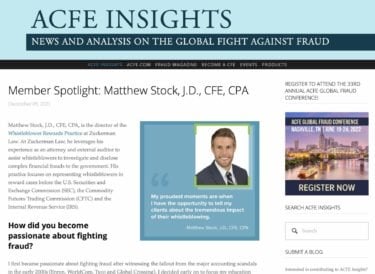5 Tips to get an SEC Whistleblower Award
Tip #1: Quickly Determine Eligibility
Analyzing an individual’s eligibility is complex. The analysis differs depending on the individual’s relation to the company and how the individual obtained the information. For example, auditors may report to the SEC and be eligible for an award if:
- they have a reasonable basis to believe the disclosure is necessary to prevent conduct that is likely to cause “substantial injury” to the financial interest or property of the entity or investors;
- they have a reasonable basis to believe the entity is engaging in “conduct that will impede an investigation of the misconduct”; or
- at least 120 days have passed either since they properly disclosed the information internally, or since they obtained the information under circumstances indicating that the entity’s officers already knew of the information.
Eligibility depends on various factors. If whistleblowers are uncertain about their eligibility, then they should consult with an experienced SEC whistleblower attorney. A skillful analysis may be the difference between a multimillion-dollar whistleblower award and no award at all.






Tip #2: Protect Yourself
Many whistleblowers risk being retaliated against for reporting information to the SEC. Fortunately, the SEC allows whistleblowers to report anonymously if represented by an attorney. If it is imperative that you remain anonymous, you should hire an experienced attorney to skillfully guide you through the process, maximizing the likelihood that your identity is not revealed.
In addition, if an employer retaliates against a whistleblower because of lawful whistleblowing, the Dodd-Frank Act and the Sarbanes-Oxley Act offer substantial protection. In a recent case, a California jury awarded a whistleblower more than $11 million after the whistleblower was terminated for raising concerns about a potential violation of the federal securities laws.
We have substantial experience representing corporate whistleblowers under the whistleblower protection provision of the Sarbanes-Oxley Act.
To learn more about protections for SEC whistleblowers, download our guide Sarbanes-Oxley Whistleblower Protection: Robust Protection for Corporate Whistleblowers.
Tip #3: Know the Rules Before Filing with the SEC
Whistleblowers should be aware of the factors that influence the size of awards before filing with the SEC and apply those factors to get the maximum award. For example, the SEC Whistleblower Office may reduce the amount of an award if the whistleblower:
- unreasonably delayed reporting the violations(s);
- participated in, or was culpable for, the reported securities-law violation; or
- interfered with the company’s internal compliance and reporting systems.
On the other hand, the whistleblower office may increase the amount of an award based on:
- the tip’s significance to the success of any proceeding brought against wrongdoers;
- the assistance that you and your legal representative provide in the SEC action or related action;
- the SEC’s law-enforcement interest in deterring the specific violation; and
- whether, and the extent to which, you participated in your company’s internal compliance and reporting systems.
Accordingly, whistleblowers have an incentive to report internally to their companies’ compliance personnel before going to the SEC.
If a whistleblower reports internally, then the whistleblower generally should also report the same information to the SEC within 120 days. That way, in evaluating a potential award, the SEC will consider the date of the internal report, rather than the date that the whistleblower reported to the SEC. As the SEC puts it, the whistleblower office will “hold your place in line.” This may determine, for example, whether a whistleblower submitted “original information.”
Tip #4: Draft a Tip that Grabs the SEC’s Attention
The SEC Whistleblower Office is relatively small, and thousands of tips are submitted annually. Whistleblowers and their attorneys should tailor their tips to quickly grab the SEC’s attention. While we could write a book on this section alone, here are a few “rules” to keep in mind when drafting submissions:
- Provide the SEC with a clear roadmap for a successful enforcement action. Do not submit a pile of documents and expect the whistleblower office to figure it out. Instead, walk the SEC, step by step, through specific and credible examples of the violation(s).
- Demonstrate how the violation is “material.” As mentioned, the SEC investigates only those violations that are serious enough to warrant the use of its limited resources. While demonstrating materiality, be sure to analyze the legal issues and tie them to the specific violations. This should include a discussion of potential challenges that the SEC may encounter and how the agency should address them.
- If possible, provide the whistleblower office with documentation of the violation. The SEC is much more likely to act on a tip that is supported by strong evidence. The SEC does not, however, want all types of evidence. For example, the SEC does not want information that may violate the company’s attorney-client privilege (e.g., documents, including emails, that involve advice from inside or outside counsel).
Tip #5: Act Fast
The timing of a whistleblower’s tip is a significant factor that the SEC considers in determining whether, and how much, to award the whistleblower. Waiting to file with the SEC runs the risk that someone else may provide the same information to the SEC first, thereby rendering you ineligible for an award.
SEC Whistleblower Program
The following FAQ about the SEC Whistleblower Program identifies the key facets of the program. For more information about the SEC Whistleblower Program, call Zuckerman Law at 202-262-8959 for a free, confidential consultation.
- What is the SEC Whistleblower Program?
- What violations qualify for an SEC whistleblower award?
- How can I submit a tip to the SEC?
- Why should I choose the Zuckerman Law to represent me in my SEC whistleblower claim?
- Can I submit an anonymous tip to the SEC Whistleblower Office?
- When is the best time to report the fraud or misconduct to the SEC?
- Can I submit an SEC Whistleblower claim if the SEC already has an open investigation into the matter?
- Who is an “eligible” SEC whistleblower?
- Can compliance personnel, auditors, officers or directors qualify for an SEC whistleblower award?
- What is “original information”?
- How might my information “lead to” a successful SEC enforcement action?
- Can I submit a claim if I had involvement in the fraud or misconduct?
- Do I have to report a securities law violations to my company before reporting the violation to the SEC?
- Can I submit a tip if I agreed to a confidentiality provision in an employment/severance agreement?
- What factors does the SEC consider when determining the amount of the award?
- What employment protections are available for SEC whistleblowers?
- What type of evidence should I provide to the SEC?
- What happens after I submit a tip to the SEC?
- How long does it take to receive an SEC whistleblower award?
- What are the largest SEC whistleblower awards?
Experienced SEC Whistleblower Attorneys
The experienced SEC whistleblower lawyers at Zuckerman Law represent whistleblowers worldwide before the SEC under the Dodd-Frank SEC Whistleblower Program.
Recently the Association of Certified Fraud Examiners published a profile of Matt Stock’s success fighting fraud:
The firm has a licensed Certified Public Accountant and Certified Fraud Examiner on staff to enhance its ability to investigate and disclose complex financial fraud to the SEC, and two of the firm’s attorneys served on the Department of Labor’s Whistleblower Protection Advisory Committee and in senior leadership positions at a government agency that protects whistleblowers.
Firm Principal Jason Zuckerman has been named by Washingtonian Magazine as a “Top Whistleblower Lawyer” and the firm has been ranked by U.S. News as a Tier 1 Firm in Labor & Employment Litigation.
Leading whistleblower law firm Zuckerman Law has substantial experience investigating securities fraud schemes and preparing effective submissions to the SEC concerning a wide range of federal securities violations, including:
- Accounting fraud;
- Investment and securities fraud;
- EB-5 investment fraud;
- Manipulation of a security’s price or volume;
- Fraudulent securities offerings and Ponzi schemes;
- Unregistered securities offerings;
- Investment adviser fraud;
- False or misleading statements about a company or investment;
- Inadequate internal controls; and
- Violations of auditor independence rules.
For more information about the SEC Whistleblower Program, download our free ebook SEC Whistleblower Program: Tips from SEC Whistleblower Attorneys to Maximize an SEC Whistleblower Award and see the following resources:
- Leading SEC Whistleblower Law Firm Featured in Article About Growing Wave of Whistleblower Lawsuits
- SEC Whistleblower Reward Program FAQ
- Auditors’ and accountants’ guide to SEC whistleblower awards
- Whistleblower Protections and Incentives for Auditors and Accountants
- How to Report EB-5 Fraud and Earn an SEC Whistleblower Award
- CFTC Strengthens Anti-Retaliation Protections for Whistleblowers and Improves CFTC Whistleblower Award Program
- SEC Cracking Down on Ponzi Schemes
- SEC Scrutinizes “Fake News” Stock Promotion Schemes
- SEC Whistleblower Program: Exposing Insider Trading
- SEC Awards for Disclosures of Foreign Bribery or FCPA Violations
- Whistleblower Rewards and Bounties for Disclosures of Market Manipulation Schemes
- SEC Targeting Investment Adviser Fraud
- Compliance Personnel, Auditors, Officers and Directors Can Obtain SEC Whistleblower Awards
- Money Laundering and the SEC Whistleblower Program
- International Whistleblower Representation – SEC Whistleblower Attorney
- Anonymous Whistleblowing: Does the SEC Whistleblower Program Protect a Whistleblower’s Identity?
- SEC Awards for Disclosures of Foreign Bribery or FCPA Violations
- Securities Fraud Enforcement Action Prompts the Question: What Was the Company Smoking?
- Compliance Officer Whistleblower Representation
- SEC Whistleblower Program: What is the SEC Form TCR?
- Tale of Two Whistleblowers: Lessons Learned from Today’s SEC Whistleblower Award
- Whistleblowers Help CFTC Obtain Record Penalties for Commodities Fraud
- Report Underscores Importance of Whistleblower Rewards and Protections for Internal Auditors
- SEC Sanctions: Whistleblower Reference Guide
- Protections and Rewards for Cybersecurity Whistleblowers
- CFTC Announces Second Whistleblower Award in 2016 as the Agency’s Whistleblower Reward Program Picks Up Steam
- EB-5 Visa Scandal Underscores the Critical Role Whistleblowers Play in Exposing EB-5 Fraud
- SEC Enforcement Director Touts Success of SEC Whistleblower Program
- SEC Whistleblower Program Not Limited to Corporate Insiders
- SEC Pays $3M Award to Whistleblower
- SEC Draft Strategic Plan Affirms the Importance of the SEC’s Whistleblower Reward Program
- Whistleblower Lawyer Interviewed About SEC Whistleblower Award
- Wall Street Journal Quotes Jason Zuckerman on Dodd-Frank SEC Regulations
- SEC Whistleblower Lawyer Quoted in National Law Journal About SEC Whistleblower Program
- SEC Whistleblower Lawyer Zuckerman Quoted About SEC Whistleblower Award for Independent Analysis
- SEC Whistleblower Lawyer Jason Zuckerman Quoted About Tips for SEC Whistleblowers
- Whistleblower Lawyer Jason Zuckerman Quoted About SEC Whistleblower Award
- Whistleblower Lawyer Interviewed About the Rise of Cybersecurity Whistleblowing
- Whistleblower Attorney Zuckerman Quoted in Washington Post About SEC Order
- Whistleblower Attorney Dallas Hammer Interviewed by Bloomberg About Dodd-Frank Protected Whistleblowing
- SEC Whistleblower Lawyer Zuckerman Quoted About SEC Whistleblower Award for Independent Analysis
- Audit committees need to dig into personal relationships
- Whistleblower Bounties Pose Challenges
- CFO Magazine Quotes Whistleblower Attorney Jason Zuckerman About Dodd-Frank Whistleblower Rules
- Fiscal Times Quotes Jason Zuckerman About Dodd-Frank Act Whistleblower Reward Provisions
- Whistleblower Attorney Jason Zuckerman Quoted About Battle Over Corporate Whistleblower Rules




